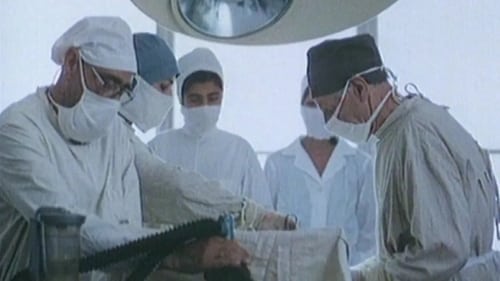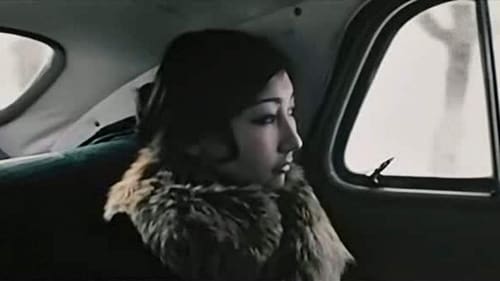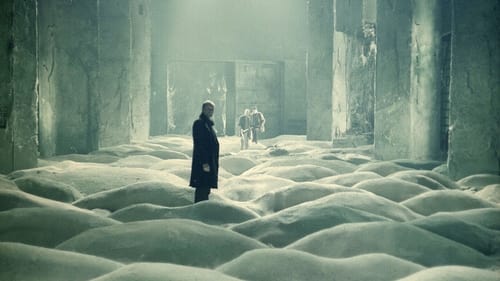
slaughterhouse's owner
Two men and a woman happen to meet in a bar. We learn from their conversations both the intriguing and banal details of their lives. But is anyone really telling the truth?

Production Design
In this heavyhanded political allegory, set in the plains and mountains of Central Asia, a tribe of people led by the fanatical Mavrut (Vladimir Msrian) wanders about in the most desolate parts of this already desolate region in search of a mythical "Land of Happiness." Their quest is hampered by the fact that they must all live a life which is extremely ascetic. One tribeswoman expresses a desire to have a child, but is rebuked by being reminded that she has vowed never to have worldly ties that would distract her from the quest. When she has a child anyway, she and her lover are made to pay for this crime in a horrific way. Despite that, the child becomes a kind of holy mascot for the group, touted by the leader as a kind of savior. They are distressed when the child goes missing one day, only to appear mysteriously on the opposite side of the rapids of a river, beckoning to them.

Production Design
A Russian doctor is invited to work at Afghanistan's top hospital during the war, and sees firsthand the carnage caused by the Islamist mujaheddin as they attempt to overthrow the socialist government.

Badmaev's assistant
Russian monk Grigori Rasputin rises to power, which corrupts him along the way. His sexual perversions and madness ultimatly leads to his gruesome assasination.

Art Direction
Russian monk Grigori Rasputin rises to power, which corrupts him along the way. His sexual perversions and madness ultimatly leads to his gruesome assasination.

Production Design
Russian monk Grigori Rasputin rises to power, which corrupts him along the way. His sexual perversions and madness ultimatly leads to his gruesome assasination.

Aspar Ramazanovich - the schoolmaster
This intriguing mixture of melodrama and politics is not divided into three parts; the title instead refers to three female characters whose lives intersect in a small town in northern Uzbekistan during the difficult days following World War II. The first is an old woman trapped in a forced marriage; the second is a schoolteacher imposing progress on the remote region; the third, and most important, is Khalima (Kambarova), an illiterate but determined young woman who resolves to build her own house without either her husband's or the state's approval. The film's harsh vision of life in postwar Uzbekistan, as well as its ambivalent attitude toward the conflicting demands of individualism and collectivism, made it the object of official disapproval.

Art Direction
Near a gray and unnamed city is the Zone, a place guarded by barbed wire and soldiers, and where the normal laws of physics are victim to frequent anomalies. A stalker guides two men into the Zone, specifically to an area in which deep-seated desires are granted.

Fottabek
The setting is Central Asia during the Russian civil war. In the post-revolutionary twenties, when the power in European Russia was (officially) "fully in the hands of the workers and peasants", but the fight against the Basmachi rebels was in full swing. When a Red Army detachment captures Sultan Mazar, the brains behind the Bazmachi contingent, a decision is made to escort urgently the prisoner to the Bukhara province. The difficult mission is entrusted to a grizzled mountain trapper and conscientious revolutionary called Mirzo. His expertise is essential to traverse the precarious paths and steep mountain ridges along the way, impossible terrain for the inexperienced. A group consisting of Mirzo, his brother Kova, the Sultan, his daughter Zaranghis and slave Saifulla set off on this journey. They are forced to fight on the mountain ridges as well as negotiate the natural dangers and harsh elements.

Production Design
The setting is Central Asia during the Russian civil war. In the post-revolutionary twenties, when the power in European Russia was (officially) "fully in the hands of the workers and peasants", but the fight against the Basmachi rebels was in full swing. When a Red Army detachment captures Sultan Mazar, the brains behind the Bazmachi contingent, a decision is made to escort urgently the prisoner to the Bukhara province. The difficult mission is entrusted to a grizzled mountain trapper and conscientious revolutionary called Mirzo. His expertise is essential to traverse the precarious paths and steep mountain ridges along the way, impossible terrain for the inexperienced. A group consisting of Mirzo, his brother Kova, the Sultan, his daughter Zaranghis and slave Saifulla set off on this journey. They are forced to fight on the mountain ridges as well as negotiate the natural dangers and harsh elements.

Production Design
An epic legend about the exploits of the legendary hero Rustam - a brave warrior who is always ready to come to the aid of those who need her. The story is based on Ferdowsi's poem "Shah-Nam". The first part of the "Exploits of Rustam" dilogy, which is continued by the film "Rustam and Suhrab" (1972).










